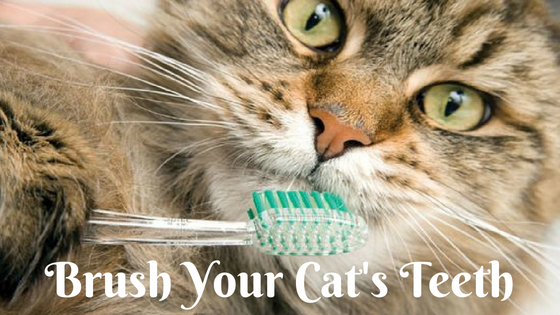Dental health is extremely important to the overall health
of our pets. Keeping their dental health in check will allow them to live
happier, healthier, longer lives.
The best way to maintain healthy teeth in our pets is
through daily brushing. Although training your dog to allow you to brush their
teeth is usually much easier than training your cat, daily brushing is equally
as beneficial for our feline friends. Training your cat to allow you to brush
their teeth usually takes time and patience, but remember that in the end daily
brushing can save your pet from painful dental health issues as well as prevent
or delay them from undergoing expensive but necessary dental cleanings and
extractions under general anesthesia.
Ideally, brushing should occur every day, but brushing at
least twice per week can help to cut down on the buildup of tartar on your
cat’s teeth. Brushing can be done with a small cat toothbrush or finger brush
or a small child’s toothbrush, but should always be done with a specialized
enzymatic cat/dog toothpaste. Human toothpaste often contains ingredients that
can be harmful to your cat including fluoride and xylitol. In addition, pet
toothpaste works enzymatically in order to decrease the amount of mechanical
brushing needed to remove plaque and is flavored to make the experience more
enjoyable for your cat.
Training your cat to accept having its teeth brushed will be
easier if you start when your cat is just a kitten and practice daily, although
it is still possible to train an older cat to have its teeth brushed. In order
to start training choose a calm and quiet place. Stat by holding you cat in
your lap and gently rubbing your finger over your cat’s teeth. Once your cat
accepts this, transition to using a soft cloth, and then to a toothbrush.
Finally, apply a small amount of pet toothpaste to the toothbrush before
brushing. Be sure to end each training session on as positive a note as
possible. Give you cat a special treat that he enjoys such as wet food,
greenies, lots of patting and attention, or play time with a laser pointer or
his favorite toy.
Initially your pet will likely not tolerate the brushing for
more than a few seconds. This is normal, and it will take time to gradually
increase the time he will allow you to brush his teeth from a few seconds to
about 30 seconds on each side. It is not necessary to brush the insides or tops
of your cat’s teeth, since the majority of tartar accumulates along the outer
surfaces of the teeth. It will also be necessary to open your cat’s mouth
slightly in order to reach his furthest molars. This should be done once your
cat is comfortable with you brushing his other teeth. The best way to open our
cat’s mouth is by using one hand to tilt your cat’s head backwards while
holding his top jaw with your thumb and index finger.
Remember that patience and consistency are key factors in
training your cat to have his teeth brushed.
source: riverroadveterinary.com














No comments:
Post a Comment